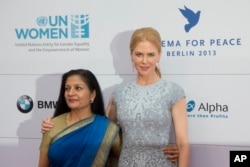What do World Cup champion Abby Wambach, Grammy-nominated singer-songwriter Jewel, and Assistant Secretary-General of the United Nations Lakshmi Puri have in common?
Each of them is a fighter in the struggle for gender equality and has overcome stacked odds to become a 21st-century champion for change. Each spoke with VOA after a Foundation for Gender Equality event at the UN last week.
Lakshmi Puri, assistant Secretary-General of the United Nations and Deputy Executive Director of U.N. Women, hopes to eliminate the gender leadership gap that remains prominent across public and private sectors.
Worldwide, less than 1-in-5 government ministers is a woman. Among heads of state, the figure drops to about 10 percent, or 18 out of 175.
Puri considers her role in the development of U.N. Women – an organization dedicated to the empowerment of women worldwide – “the most important project for humanity” of the century.
Challenging norms
Puri, who was born shortly after India’s independence, gives credit for her rise to success to her parents, who she describes as feminists.
She thought she would become a doctor early in life, but entered the world of diplomacy instead.
Her first assignment as a female diplomat in Japan was a challenge, she said.
“You will handle administration,” she remembers the ambassador telling her at the time, someone she described as a fair person.
“I said, ‘Why?’ and I demanded my rights," Puri said.
"Oh, it’s nothing against you, but in Japan, no editor will receive a woman. It’s just not done," she remembers the ambassador saying.
Puri responded with a challenge. “Give me three months, and if I can’t show you that I can get access, that I can reach out, then OK, I’ll do administration," she told the ambassador.
Less than three months later, she says, she proved her point. “I had even better access than any of my male counterparts could have had.”
Abusive home to Grammy nominee
American singer-songwriter sensation Jewel had an even less likely path to personal success.
Jewel grew up in an abusive home, moved out when she 15, and later became homeless after she refused to have sex with a boss.
“I knew that, statistically, girls like me end up repeating the cycle that we were raised with,” Jewel said. “Statistically, I should end up in an abusive relationship or on drugs or on a pole or some combination of those things, and I wanted to avoid being a statistic.”
When Jewel left home, she cleaned buildings and gave horseback rides to tourists for a living, and only began singing when her health prevented her from holding down other jobs.
She says her early bar-singing days prepared her for life’s toughest challenges.
“I was taught from a very young age to handle, sadly, sexual harassment ... to see what people’s motives were, to learn to read people really well and to learn to stand up for myself," Jewel said.
She said she learned not to let periods of doubt and fear get in the way of her success.
Jewel has amassed four Grammy Award nominations and sold over 27 million albums.
She is also the founder of Project Clean Water, a nonprofit charity foundation that works to provide safe drinking water to communities in need.
“Choosing to see where change is possible while you’re aware of the odds against you actually takes tremendous courage,” Jewel said. “So I think what a lot of people call ‘cynicism’ and those types of things is really just cowardice … we need people with courage.”
Fight for equal pay
Just as Puri is fighting for women’s leadership and equal opportunity around the world, and just as Jewel is a voice for victims of violence in all its forms – physical, emotional and mental – the U.S. women’s soccer (football) team is doing its part, too, to fight for equal pay.
Worldwide, women's earnings average 60 to 75 percent those of men’s wages. In U.S. soccer, it’s roughly one-quarter, even though the women’s championship team generated greater revenue in 2015 than its male counterparts.
The wage discrepancy is both “unconscionable” and an outdated “hunter-and-gatherer stage of evolution,” said 2015 FIFA World Cup champion and two-time Olympics gold medalist Abby Wambach.
“Do I believe women deserve to be paid and treated equally? You’re damn right I do," Wambach said.
“Gone are the days that it’s just a feel-good thing to do,” said Wambach, who retired following the U.S. women’s 2015 championship season. “It’s been proven now in North America and the United States that if you invest in women’s soccer, you will actually get a great return on your investment.”
Five current members of the U.S. women’s soccer team filed a complaint to the U.S. Equal Employment Opportunity Commission in March, alleging wage discrimination by the U.S. Soccer Federation.
‘Champion your own way’
Wambach, who is openly gay and an outspoken advocate for gay and transgender rights, signed a multiyear contract with ESPN this May as an analyst and contributor. She says her decision to accept the position was made easy because the company did not want to change her.
“It was very important to me that I wasn’t going to change to fit the mold of what many people think broadcasters should look like, act like, talk like, dress like,” Wambach said.
Above all, Wambach’s message to young women everywhere is simple: “champion your own way.”







